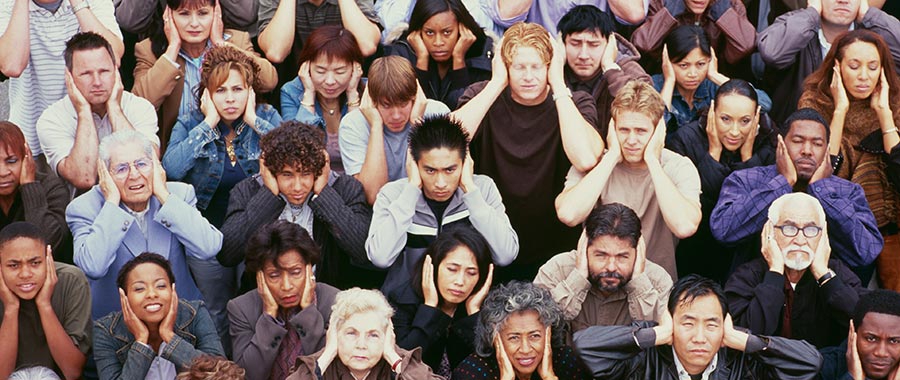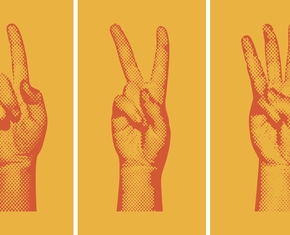The views expressed in our content reflect individual perspectives and do not represent the authoritative views of the Baha'i Faith.
When someone else’s point of view on social, religious, or political topics differs from and opposes our own, it can take courage to continue engaging with them.
Sometimes, in this polarized era, it seems impossible—like there’s a huge wall between them and us, or a vast gulf that cannot be crossed. But many of us still try to find a way. One light that shines on that path is the Baha’i approach to unity.
This isn’t just about the satisfaction of proving one’s point or feeling vindicated in a debate. The lives and well-being of others are often what’s at stake when discussing these topics. Pretending we don’t care, or that a situation is hopeless isn’t good enough. True compassion for a suffering humanity can instill in us a determination to never give up. So even though it may seem impossible to overcome barriers in public opinion, many of us feel that we still have to try. We feel compelled to see what can be gained by trying to get through to those we strongly disagree with.
The Baha’i teachings say:
… regard ye not one another as strangers. Ye are the fruits of one tree, and the leaves of one branch. – Baha’u’llah, Tablets of Baha’u’llah, p. 163.
It’s easy to identify with those words when we think about them on their own—but it’s harder when we try to apply them to real life. When the points of disagreement are so many and the common ground so small, it can seem impossible to not see people we strongly disagree with as strangers.
One way to move forward on that problem: don’t make your opinions the standard against which all others are measured. The wisdom we have is not the only wisdom. The paths we choose may not be the only ones leading to our highest goals. The prominent 20th century Baha’i Ruhiyyih Rabbani offered these words of advice:
The Baha’is must always bear in mind that generally in the world today any idea of oneness—whether advanced by a political or a religious group—is based on the concept of uniformity: “You be like me, accept my philosophy, my way of doing things, my standards in life and then we will have a united, peaceful world.” The concept advanced by Baha’u’llah is, on the contrary, based on diversity; this is a very profound difference, and as one is the concept of men, and the other the Divine Revelation of God, it behooves us to truly grasp what Baha’u’llah means. – Ruhiyyih Rabbani, A Manual for Pioneers, p. 32.

Ruhiyyih Rabbani (1910-2000)
She wasn’t saying that nothing matters, or that anyone should believe whatever they want—instead, she suggests that points of agreement rather than disagreement should receive greater attention in relationships. We should widen our circles and not be so quick to exclude.
Ruhiyyih Rabbani’s inclusive Baha’i perspective contrasts clearly with certain tendencies we often encounter in the realm of public opinion. Debates around social, cultural, religious, and political issues are talked about as wars, revolts, and battles for hearts and minds. We hear we must pick a side and fight back. But who’s to say that there is ever a stark black-and-white separation between one side and another? Public opinion is more complex, nuanced and fragmented.
If we examine public opinion closely, we’d see that very few people think the exact same way as anyone else. Rather than something that isolates us, this fact actually gives us an opportunity for greater unity. Living in community with others means we’re always surrounded by people with different perspectives on important issues, even if those variations are quite small. It’s not just that some people are in one camp and everybody else is in another. We’re always agreeing or disagreeing with everybody in slightly different ways.
Living with difference is what we’re already doing anyway. We can use that experience and a strong dose of love to try to get through as much as possible to as many people as we can. If we can’t reach somebody, then maybe someone else can. So we should especially reach out to that third person who stands in between.
Expecting uniformity is an impossible fantasy. But the wiser ones among us don’t let that get them down. There is value in trying to influence public opinion in a positive direction, even if the outcomes don’t line up 100 percent with our personal views. That might be the only way to get through to someone who strongly disagrees with us. They’ll probably never make a full conversion to our way of thinking, but our capacity to nudge things in a better direction could be essential to keeping the public discourse a conversation worth having.
















Comments
Sign in or create an account
Continue with Googleor